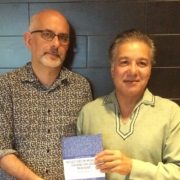Textbooks are perhaps the most recognizable part of school systems. You go to school; you learn from a textbook.
But what’s inside that textbook your reading? Who wrote it? How are controversial issues dealt with? And how have textbooks changed over time and compare across the country?
My guest today, Jim Williams, has edited or co-edited three volumes on textbooks. The many chapters across the volumes looked at textbooks around the world. The first volume looked at textbooks and national-governments. The second volume explored the issue of identity. And the last zoomed in on textbooks in post-conflict settings.
Jim William is the UNESCO Chair in International Education for Development and Professor of International Education & International Affairs at the George Washington University. While on sabbatical in Tokyo, Jim was kind enough to stop by my office where we recorded this interview.
Citation: Williams, Jim, interview with Will Brehm, FreshEd, 81, podcast audio, July 10, 2017. https://www.freshedpodcast.com/jimwilliams/
Transcript, Translation, Resources:
Will Brehm 1:59
Jim Williams, welcome to FreshEd.
Jim Williams 2:01
Thank you for having me.
Will Brehm 2:02
So you have recently, over the last few years actually, edited or co-edited a few volumes on textbooks, and history and identity and memory, looking at all sorts of different countries around the world. What can a comparative study of textbooks begin to tell us?
Jim Williams 2:24
Thank you for the question. Comparative study of textbooks, and I suppose most anything, gives you an angle on by looking at other places, one gets a certain amount of insight into one’s own place: How it’s the same, perhaps, as others, how it’s different than others. And so one benefit of a comparative study is that it allows you to see – say the US or countries one knows well, feels strongly about the education of – to put them in a larger perspective and to see what’s unique, what’s similar in the different places. And so it gives you just a bigger perspective. One thing. You can also look, the way these are organized, is they’re organized comparative across countries. Initially, the idea was to compare across countries, but also compare how textbooks within each country had changed over time, during a period of some kind of crisis. And that, we realized to some extent. Not perfectly. But one of the other dimensions of comparison that is interesting is to look at the textbook portrayal of particular events and how that changes over a period of time within a country. Because presumably, the history, whatever that is, the facts of the situation have not changed in any real way, but the understanding of them, the portrayal of them does. So that’s interesting. And then also to look across different publishers, different editors. In some countries it makes a great deal of difference which publisher you look at, how the history is told, and other places it doesn’t, depending on how they’re made. So what do you get out of it? You get some insight into, like anything, you see similarities where you didn’t realize them. You get a bigger perspective on one’s own place and other places. And you also get a sense of differences where you thought there might be some. Instructive differences.
Will Brehm 4:46
So, let’s look at each of these different lessons learned. To start, what did you learn about, say America and American education by studying the textbooks from other countries?
Jim Williams 5:04
Good question. I approached this like a lot of people perhaps doing this kind of research: with a perspective, certainly a bit of outrage, I suppose. At my own country’s textbooks, how they portrayed different events and how they talked about. And one thing I learned pretty quickly was that the US certainly does outrageous things with textbooks, but we’re by no means the only one. It seems quite common to do, but outrageous. To tell history in ways that seem biased or pushing a certain agenda, that kind of thing. Leaving out lots of important details or highlighting others, smoothing things over, that kind of thing. So the US is not alone in doing that.
Will Brehm 6:02
And is there a country that sticks out in your mind that was the most outrageous?
Jim Williams 6:14
It’s hard for me to get away from my own perspective on this. Perhaps one of the more outrageous would be the shift in Russian textbooks over the last, say 15 years. The narrowing of certain topics, the focusing on – not to demonize Russia – but the focusing on certain kinds of facts as opposed to inquiry. The use of a kind of a “truth from the top, so learn it” kind of approach to pedagogy, and the valorization of the Church, of powerful leaders, that kind of thing. I was, admittedly, told by someone from one of the former republics who perhaps didn’t really agree with the direction that Russia was going, but it was interesting the telling of it. So even if it’s got a perspective, it’s an instructive one. So that would be one. I still think the US is hard to beat, but again, that’s my own bias. But it’s hard to beat in its failure to really address the big sense of US history.
Will Brehm 7:41
Which are?
Jim Williams 7:42
Well, slavery, taking the land from native people, probably a certain amount of international role – the Philippines, that sort of thing. I would say our international relations are often based on a quiet US-centric perspective, at least. And then Indians, of course, and slavery.
Will Brehm 8:12
So a lot of these textbooks, so in Russia and America and other countries as well, it seems like what you’re saying is that what is found in textbooks, you can kind of read to understand the larger, sort of political economy of the country, the particular direction the country is going, or a particular kind of historical memory that that country would have.
Jim Williams 8:35
And I’m sure that’s a fallacy of some kind to do that, but it is interesting and I think you can get something from it. It’s not a perfect lens, but it does give a certain angle on what is considered authoritative enough to include in the textbooks.
Will Brehm 8:59
Right, and in many ways because, particularly public school textbooks are often controlled by some level of government. In the US, it’s not the federal government, it’s lower levels, but in other countries it is the Ministry of Education publishing the textbook. So in many ways, it is reflecting, in a sense, the official narrative or discourse or ideology of the state.
Jim Williams 9:28
More or less.
Will Brehm 9:29
More or less. There can be differences.
Jim Williams 9:32
There can be differences. And I think one of the interesting differences across books and countries and times was the extent to which that was a tight linkage and to the extent which there was looser, allowing for more room for interpretation of the historical material presented.
Will Brehm 9:57
Do you have any examples of that?
Jim Williams 9:59
The US is actually not a bad example of that. There’s a strong, dominant set of stories, narratives that the US textbooks portray, present. But there’s an awful lot of information and a lot of prompts, particularly in recent books. A lot of original source material. And so there’s a great deal of room for teachers and students to come up with their own understanding. And so it was very interesting looking at US textbooks from the 1930s, really each decade over the last 70-80 years. And the US textbooks had become huge – history textbooks, we’re talking about now. Often 3000 pages in two volumes and that doesn’t include the extra material that’s available online or the CDs. And rather than a single text, each page has 5-10 images of little snippets of stories, quotations, narratives, interpretations, questions. There’s a huge amount of room for teaching if you just think about the book, not thinking about standards or tests or anything like that. But if you just look at the book, there’s a huge amount of room to customize and make it either a very pedagogically, teacher-centered kind of approach or much more inquiry-centered. So that’s interesting.
Will Brehm 11:42
Did you get into why that change happened in the American case?
Jim Williams 11:47
I didn’t look at it in any systematic way, so I think I would guess that the rise of historians really, in challenging the old textbook style, you know, one voice, no agents, just the storyline facts and maybe a few little figures of pictures and such. They challenged that and tried to bring it out. I’m sure that’s got to be a lot of it. So there’s a lot of historian of positive academic influence, it seems to me, on the textbooks. The thing is, though, that if you’ve got 3000 pages, you can’t do it all.
Will Brehm 12:30
In one academic year.
Jim Williams 12:32
Yes. And so it, in a sense, gives the teacher a lot of agency or responsibility in choosing what to do. And so that’s a good thing.
Will Brehm 12:52
I want to go to one of these other lessons that you learned: something about these different publishers. Because I wonder if some of the changes that you’re talking about in the American case, and also earlier talking about how America is a good example … often that there’s a diversity of voices. And I wonder if it’s about having these different publishers, and it’s not a national ministry producing it. So I want to ask you about this lesson learned. The different publishers that exist – and you said you can see differences between publishers – what sort of findings stick out to you?
Jim Williams 13:33
Again, I didn’t look as systematically as I would if I were had gotten these questions five years ago. But I think it’s interesting. Part of it, I believe, in the US case is the publishers competing with each other. And so the brighter and shinier the presentation to students, and the more teacher friendly and/or standard friendly it is, the more likely surely the book will be adopted and purchased. And so I think one explanation might be marketing. It’s just easier to sell if it’s pretty and lots of interaction. And US, and probably everyone, but children in the US seem to be much more attentive to the design, to the interactivity of it, etc, etc, that kind of thing. So that’s one piece. It’s interesting, I looked at Texas in particular, looked at their recommended textbooks, because Texas is one of the big markets and there’s a feeling, which I could document but haven’t, that if it satisfies Texas, you’ve got the conservative side down. And so textbook publishers seem to see Texas as kind of the guardrail on the right. On the left, I don’t know. I’m not sure there is a guardrail or a standard, but I think there’s often a concern about satisfying the conservative elements in US political life, and then doing as much inquiry, what I would think of as progressive in pedagogy as you can to get away with that. Some textbook publishers are much more conservative systematically over a period of time, and others more liberal and more open. I followed one publisher for 70 years, and again, not totally systematically, but just looking at how the books changed over 70 years. And it’s interesting. Some things stayed the same. Some of the authors stay on the textbooks years after they died. I guess that makes sense because they wrote, but the 2012 edition, one of the authors is someone who died in 1990 kind of thing. It just seems odd to have a new edition completely updated with an author dead for a while. There’s a lot of consistency over time but it seems that the original black and white portrayals become colorful, more, something like that. Political orientation doesn’t seem to change much.
Will Brehm 16:37
Right. And what about, not just looking at the US, but other contexts, what sort of events changed over time in some of these textbooks? You said the portrayal of events in some was another comparative lesson you learned. Are there any kind of quintessential examples of events and how they’ve changed in their representation in textbooks over time?
Jim Williams 17:07
Not to overkill it, but Russia again tells a very different story in the early 1990s and the 2000s about its past. The facts are similar, but the portrayal is much more national, more authoritative. At least authoritative. For sure, let’s see other places that have changed, others must have changed quite a bit. Any countries that looked at pre- and post-independence almost always, of course, changed in their portrayal of the colonial, but not as much as you would think. Some elements stick around. Snow in tropical countries. For some reason, it seems to be difficult to get rid of snow. The colonizers often came from the North and they had snow, and so they wrote about it in the textbooks for reasons that are not quite clear. And then, for some reason (a very side point), a lot of the former colonies still have snow sticking around, and one wonders 40 years after independence: Why?
Will Brehm 18:38
And these are places that get no snow?
Jim Williams 18:40
They get no snow, yeah. So I guess one of the lessons, it’s a trivial point in some ways, but one of the lessons is that once something is written, it assumes a kind of life of its own and stays. At least it has to be challenged fairly thoughtfully to get rid of it. And so you have these sorts of things. That doesn’t answer your question.
Will Brehm 19:07
But it makes me think. It’s interesting to think that this text that is written takes a life of its own. It becomes an agent in many ways.
Jim Williams 19:16
It does.
Will Brehm 19:16
And it’s more so than the author. The author could be dead, like you said, but this text lives on and still influences and gets impacted and gets reunderstood and has very active qualities.
Jim Williams 19:33
Cambodia is interesting. Cambodia’s telling of its past, of course, has shifted. Certainly between the era when Vietnam was in charge to the era when I guess the international community was more in charge. And so that telling, even though with the international community playing a big role in Cambodia, the leadership has remained fairly stable. And watching Cambodia tell its stories: Who was, in a sense, wrong? Who was right? What happened? is an interesting case because it’s tricky. In some sense, depending on how you understand it, no one is free of some wrong and where the wrong gets placed is tricky to manage.
Will Brehm 20:39
Yes. And oftentimes, in textbooks, when these are helping create national identity, oftentimes it’s about “othering” some group. And it sometimes and oftentimes other countries, neighboring countries, saying that Cambodians are not Vietnamese, or not Thai, and it’s very clear to draw these discursive borders around the identity.
Jim Williams 21:08
Absolutely, and in Cambodia’s case, I think “not Vietnamese” is a big one. “Not Thai”, I guess is there, but I didn’t see it in the chapters that I worked with.
Will Brehm 21:22
That’s right. And in Thailand, it’s also “not Vietnamese”, and that’s how their sort of textbooks are created as well.
Jim Williams 21:31
One way is “othering” others, and another way is diminishing, omitting.
Will Brehm 21:39
Omitting. Forgetting a history.
Jim Williams 21:41
Yes, or just not talking about it, or minimizing it. So that’s one of the reasons I think the US textbooks are so outrageous. They talk about slavery, and talk about the native populations, but it’s the taking of the land. But it arouses no outrage as it seems like it should.
Will Brehm 22:02
Yes, it’s like very normalized.
Jim Williams 22:03
Yes, and often very short. One textbook I looked at from the 30s, had, I think it was five pages referencing the native population. Out of, I don’t know, 5-600. So that’s really pretty minimal kind of reference.
Will Brehm 22:21
Just a token sort of acknowledgement.
Jim Williams 22:24
Yes, just you’ve got to say something.
Will Brehm 22:29
Some of these minority groups that obviously at times get left out of these official narratives, were there any cases in these volumes that you co-edited that showed a success of a minority group getting integrated into the textbook?
Jim Williams 22:48
The approach to integrating minorities is interesting. Maybe Canada and the US would be interesting. Canada went through a very thoroughgoing … and Australia as well, I just don’t know the Australia case, and don’t have a chapter on Australia. But Canada is interesting because it went through a thoroughgoing revision of its view of its past and particularly the relationship with native people, First Nations, I guess. And that’s absolutely clear in the books, and their, what I would consider very positive affirmation of the importance of the different groups that make up Canada and the indigenous people, the errors that the government and the people now see in past treatments and the current efforts to redress those differences. Very, very clear. And in the US, there is that it fits into the US narrative of … James Loewen put it, what is it? “The US started out pretty good and it’s been getting better ever since.” So, yes, we began to realize that we had some problems with minorities, and so then we took steps to address them. There were some struggles, but now we’re doing much better. And part of it is the appearance and just images. Previously their earliest times, in very stark terms, there were only heroes who tended to be military or political leaders – white men. And then gradually, there were groups of people. And then gradually, we started to see minorities appearing in uniform. So, Italian Americans fighting in World War II, Japanese Americans fighting in World War II, women appearing supporting roles, and then etc. And so somehow in the US then the portrayal of minorities in the military seems to signal a kind of acceptance and integration. And there’s discussion of, of course, the social process, political process that are happening at the same time. But it’s interesting, you can, just watching over the decades, you begin to see one and then two and then three soldiers of a different ethnic group. And even naming ethnic groups was something that was not really done, other than in the chapters about immigration. So there’s much more of unexplicit recognition of minorities, just naming of them I think, naming and visualizing.
Will Brehm 25:59
And that’s pretty powerful statement.
Jim Williams 26:02
It is, yes.
Will Brehm 26:05
So, you have a whole book, one of the volumes is on post-conflict countries. What is the significance and role of textbooks and history education in post-conflict countries?
Jim Williams 26:21
It’s a good question, and a complicated answer maybe because I’m still working it out. During conflict textbooks tend to either, depending on the wealth of the country, I suppose, the resources, textbooks tend to be either they stay put, you know, nothing happens. And so during the conflict, after the conflict, you end up with books that are however many years old, and they have the old stories. And that lasts for a good while in a lot of places. Some places, the US had resources to mobilize to change textbooks such as to, in a sense, mobilize the population during wars. And so textbooks produced during World War II and slightly after, tended to be a kind of a mobilization mode. And the Cold War was definitely a mobilization period in the US. (I’m talking about the US a lot.) And definitely a period of kind of getting people going. But most countries just leave them alone. And most places that I have looked at, the books looked at, curriculum revision takes a while and particularly if it’s a conflict in which there’s an interstate conflict, it’s not so bad. Not so difficult to revise the textbooks. Usually there’s a winner and a loser. If you’re the winner, that’s easy. You tell the story of how your virtue won. If you’re the loser, it’s more complicated because you have to explain how it is that, despite being a virtuous people, you lost, fought the good fight, or something. But internal conflict is much more difficult: Rwanda, Liberia, Cambodia are those places much harder to tell the story because it’s inside and it’s often not finished with the cessation of actual armed conflict. And so you’ve still got all these groups that are not quite finished what they’re fighting, or the hostilities remain; the core conditions that led to the conflict may not have been resolved, often aren’t. And it’s very very hard to tell a story about that. And so I’m convinced that it basically takes a generation before that story can be written. Rwanda, for 10 years, maybe, after the genocide, didn’t teach history. And then they did. And then the textbooks were revised. And they talked about it gingerly. They talked about it, in a sense, attempting to not reignite conflict and not by, in a sense, not mentioning ethnicity, or at least not emphasizing ethnicity. So it’s tricky to do that. Textbooks, because it’s an authoritative version and there may not be an agreement about what actually happened, who was at fault, that kind of thing, they tend to be fairly close to the facts that everybody agrees on when they talk about internal conflict. It may take a while to come out with something. But even more interesting was the question that arose: Often we think, maybe drawing on the experience of Germany after World War II, where it, with support from European agencies and the US, I suppose in some way, and scholars in Germany and such, used textbook reform revision as part of the larger peace process, with Poland and France. That did not happen in Japan. And textbooks remain a very hotly contested item in East Asia. Japanese textbooks about World War II still not resolved. So, there’s a question about, in many cases, should schools be teaching, trying to do this? We often think of schools and textbooks as mechanisms for peace and reconciliation. I’m not sure that many people in post-conflict situations think schools ought to be doing that. They probably think schools ought to be teaching kids skills so they can get jobs, cooperation so we can get on with things, national kind of unity such as is possible so that we can move forward as opposed to dredging up the past. And so there’s often an angle, it seems, of looking to the future, “Let’s not dwell on the past” kind of thing in that situation.
Will Brehm 31:36
That would leave the teaching of history in a very problematic place.
Jim Williams 31:40
It leaves in it a pretty problematic place. Bellino Michelle, coauthour of actually this last book, but she wrote a very nice chapter in the first one, in which she talked about memory communities in Guatemala, essentially the remembering the Civil War in very different places out side of school. Not the kind of thing taught in school.
Will Brehm 32:02
Right, and this is where historical memory comes in. Where collective memory can be understood and taught through the church or whatever religious institution, or the family. There’s so many countless kind of memorials that happen that are are not state-sanctioned, and they pass on the knowledge beyond what’s taught in schools.
Jim Williams 32:26
And so schools, including textbooks, have a remarkable ability not to talk about things. Incredible, important things. And so in the US, again, we really don’t talk about race.
Will Brehm 32:43
I know, I was amazed to learn that the Smithsonian opened up a National Slavery Museum just a year ago, less than a year ago. And it was the first one. I mean, that’s just incredible.
Jim Williams 33:01
African American History Museum, where slavery plays a big role. But it is amazing, yes, that it would take that long to do that.
Will Brehm 33:10
Right. One of the things I love about your volumes is that it shows how political education is in so many contexts. Because we often do think … one narrative of education is about skills and knowledge for the labor market, and it is sometimes very apolitical the conversation we have. Whereas your textbooks or your volumes really show how textbooks and education are so deeply political, and it’s quite refreshing in my mind to read that. So I wanted to ask as the final question: Did you change your thinking on like the politics of schooling after finishing the third volume, after going three volumes with I don’t even know how many chapters looking at countries from all over the world. Did your thinking on the politics of school change in any noticeable way?
Jim Williams 34:08
It deepened. I guess my initial hunches deepened. But I don’t know that it changed. Perhaps I didn’t learn anything from the books. I’m not sure I learned something new. I learned to elaborate the ways that initial hunches played out. I think I came to an appreciation – this isn’t quite what you’re asking, but – of these three types of history that Karataru talks about: of everyday history being what we hear around us, the kind of media, family, community, church, the stuff you come into school with, already in mind. The academic history being the kind of thing we’re trying to get at, I suppose by teaching children how to think historically. And then, the school history which marries those two, or somehow has to balance those two. Trying to be an academic by inquiry, fact-driven approach, at the same time having the charge of building a loyalty and an emotional attachment to this country, which is not necessarily natural to do that, to have that attachment. And so coming to see how different countries try to manage that, those differences and seeing how far actually most textbooks seem to be on the side of school history as political, emotional attachment process as opposed to an academic exercise.
Will Brehm 35:58
Well, Jim Williams, thank you so much for joining FreshEd. It was very much pleasure to talk all about these different books.
Jim Williams 36:04
Well, thank you. I appreciate the opportunity.
Memory, power, and identity inside textbooks










